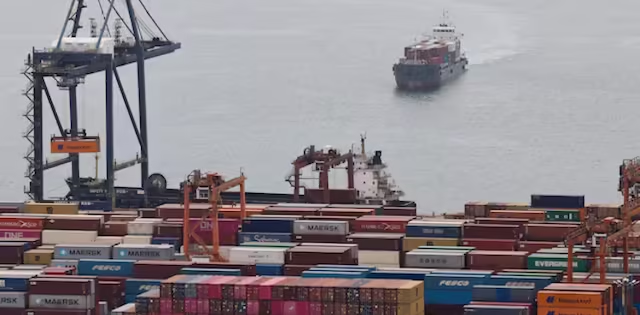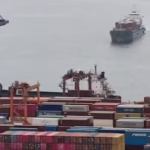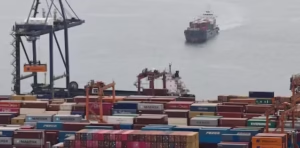Last week, US President Donald Trump threatened to increase tariffs on Chinese imports to triple-digit levels, while China announced a significant expansion of its export curbs on rare earths, raising the prospect of a full-scale trade war. However, both parties made an effort to calm traders and investors over the weekend by emphasizing the collaboration between their negotiating teams and the potential for a resolution. China stated that it has begun collecting the special charges on vessels that are owned, operated, built, or registered by the United States, but it made it clear that ships built in China will not be subject to the levies.
China outlined specific exemptions, including the entry of empty ships into Chinese shipyards for maintenance, in information released by state broadcaster CCTV. Following an annual billing cycle that starts on April 17, the additional port fees imposed by China would be collected at the first port of entry on a single journey or for the first five voyages within a year. The administration of U.S. President Donald Trump indicated early this year that it would impose tariffs on ships connected to China in an effort to strengthen American shipbuilding and weaken China’s hold on the world’s maritime market. The fines were made possible by an inquiry conducted during the administration of former President Joe Biden, which found that China dominates the global shipbuilding, logistics, and maritime industries through unfair rules and practices.
Last week, China responded by declaring that it will start charging its own port fees to vessels connected to the United States on the same day that the American levies went into effect. According to analysts, China-owned container carriers will be the most impacted, bearing almost half of the $3.2 billion in fees that are anticipated to be incurred by that market in 2026. On Tuesday, the commerce ministry called on the United States to “correct its erroneous practices” and instead engage in consultation and engagement. It stated that “China will see it through to the end if the U.S. chooses confrontation; if it chooses dialogue, China’s door remains open.” According to Beijing, five U.S.-affiliated businesses of the South Korean shipbuilder Hanwha Ocean were sanctioned on Tuesday for allegedly “assisting and supporting” a U.S. investigation into Chinese trade practices.
In a message to News Channel, Hanwha stated that it is aware of the announcement and is carefully examining how it might affect the company’s operations. The shares of Hanwha Ocean (042660.KS), which opened a new tab, fell by almost 6%. China also started looking into the impact of the U.S. investigation on its shipbuilding and shipping sectors. FRIGHT OF FREIGHT In a research note, Athens-based Xclusiv Shipbrokers Inc. stated that “this tit-for-tat symmetry locks both economies into a spiral of maritime taxation that risks distorting global freight flows.” According to a Shanghai-based expert who counsels multinational corporations on trading with China, the new fees might not have a significant impact on the sector and any increased expenses would most likely be reflected in higher prices.
“How will we proceed? Give up shipping? The expert, who asked to remain anonymous because he was not authorized to speak to the media, stated, “Trade is already fairly disrupted with the U.S., but companies are finding a way.” Last Friday, the United States announced a carve-out for long-term charterers of Chinese-operated tankers transporting LPG and ethane from the United States, postponing port fees until December 10. However, according to its Americas analyst Samantha Hartke, ship-tracking firm Vortexa found 45 LPG-carrying VLGCs, or 11% of the entire fleet, that would still be liable for China’s port fee.
According to a report by Clarksons Research, oil tankers, which make up 15% of the world’s capacity, may be impacted by the new port costs. According to Omar Nokta, an analyst at Jefferies, the impact will be seen by 13% of crude tankers and 11% of container ships worldwide. RETALIATION Trump vowed Friday to impose new export curbs on “any and all critical software” by November 1 and impose additional 100% tariffs on Chinese goods in retaliation for China reducing exports of vital minerals. Hours later, administration representatives issued a warning that nations that support a plan by the United Nations’ International Maritime Organization to cut greenhouse gas emissions from ocean commerce that warm the planet this week risk penalties, port restrictions, or punitive vessel fines.
The IMO idea has received public backing from China. “The weaponization of environmental and trade policy indicates that shipping has evolved from a neutral medium of international trade to a direct tool of statecraft,” Xclusiv stated. Early Tuesday trading saw a more than 2 percent increase in shares of COSCO, a company listed in Shanghai. In order to preserve firm value and protect shareholder interest, the company said that its board had approved a proposal to buy back up to 1.5 billion yuan ($210.3 million) worth of its shares over the course of the next three months. The shipping firm did not immediately respond to News Channel’ inquiry about the port costs.



















